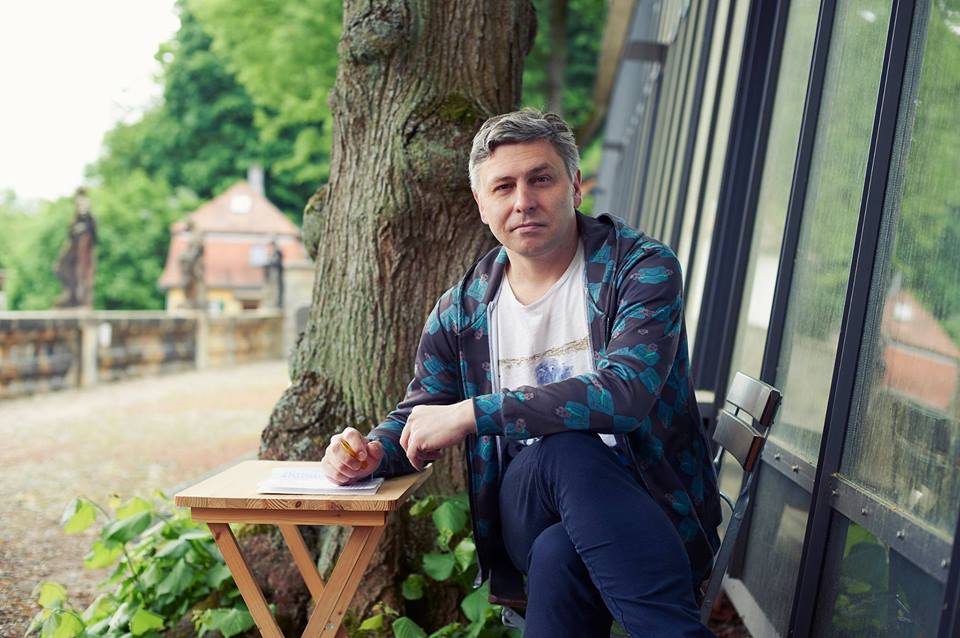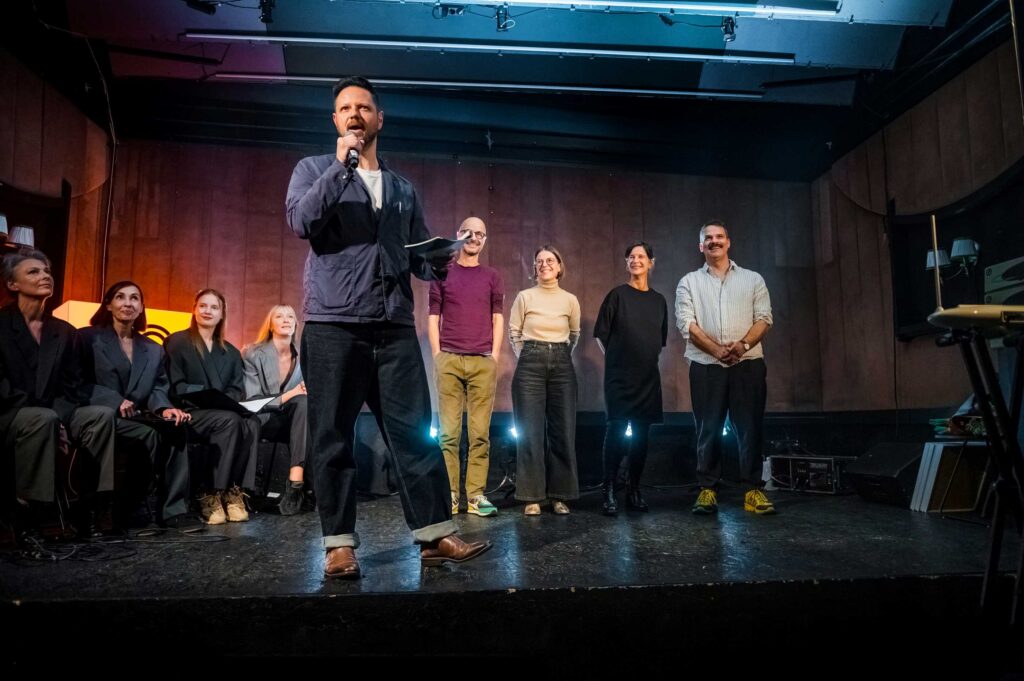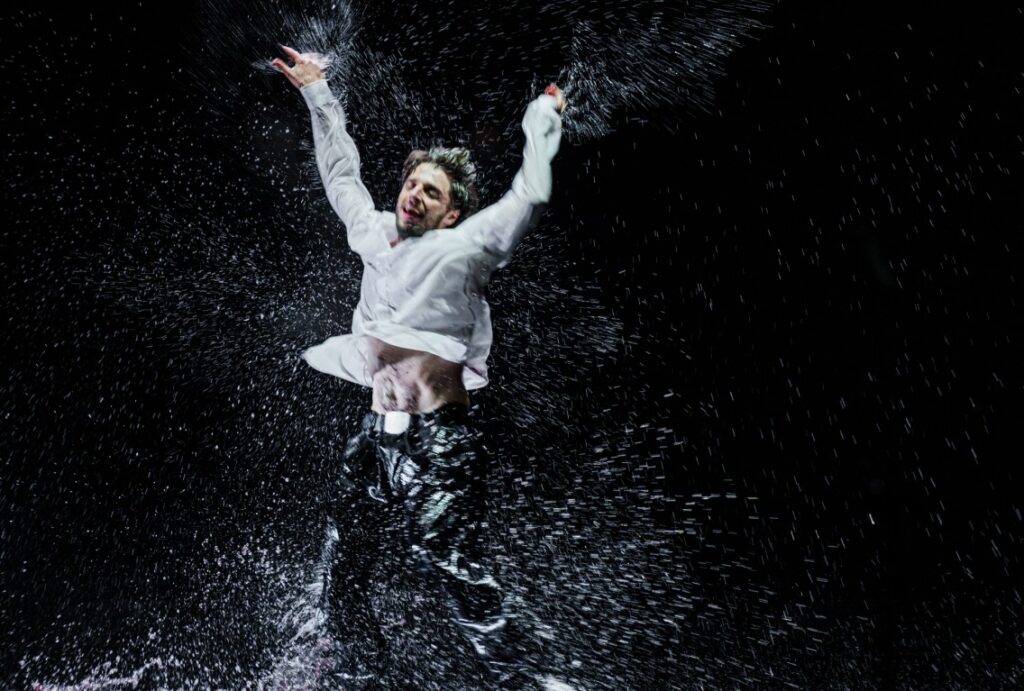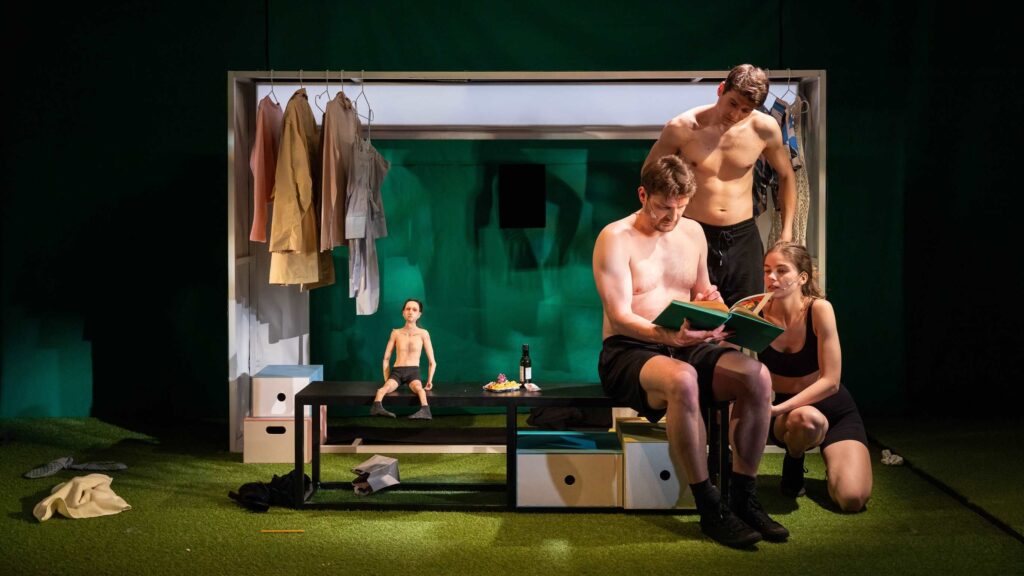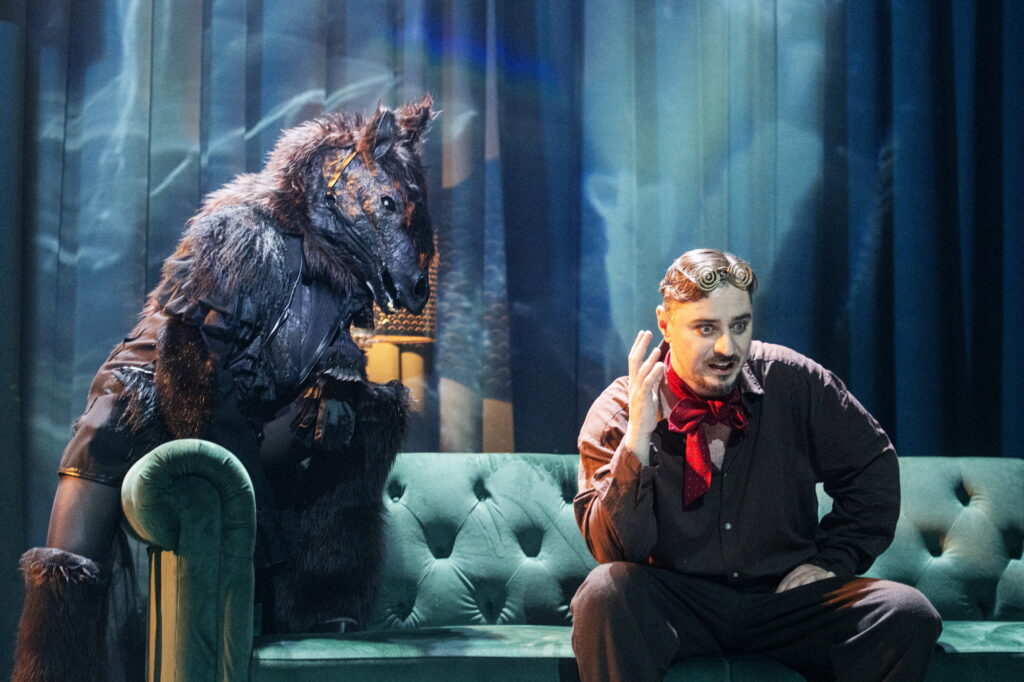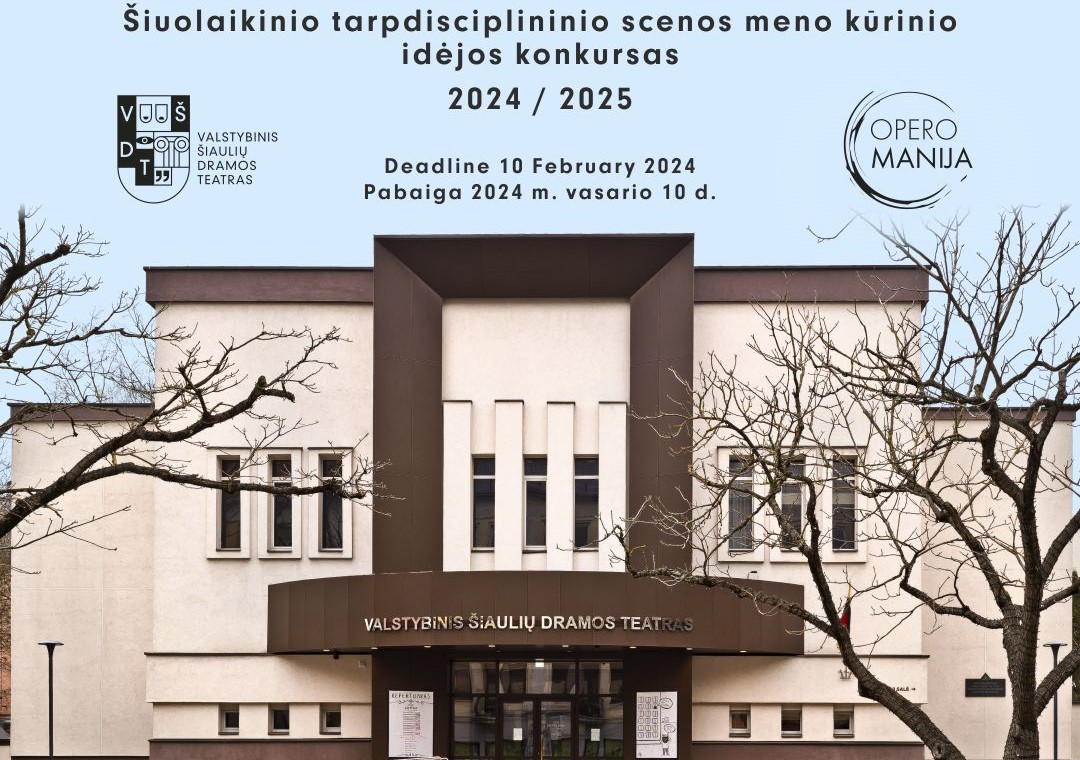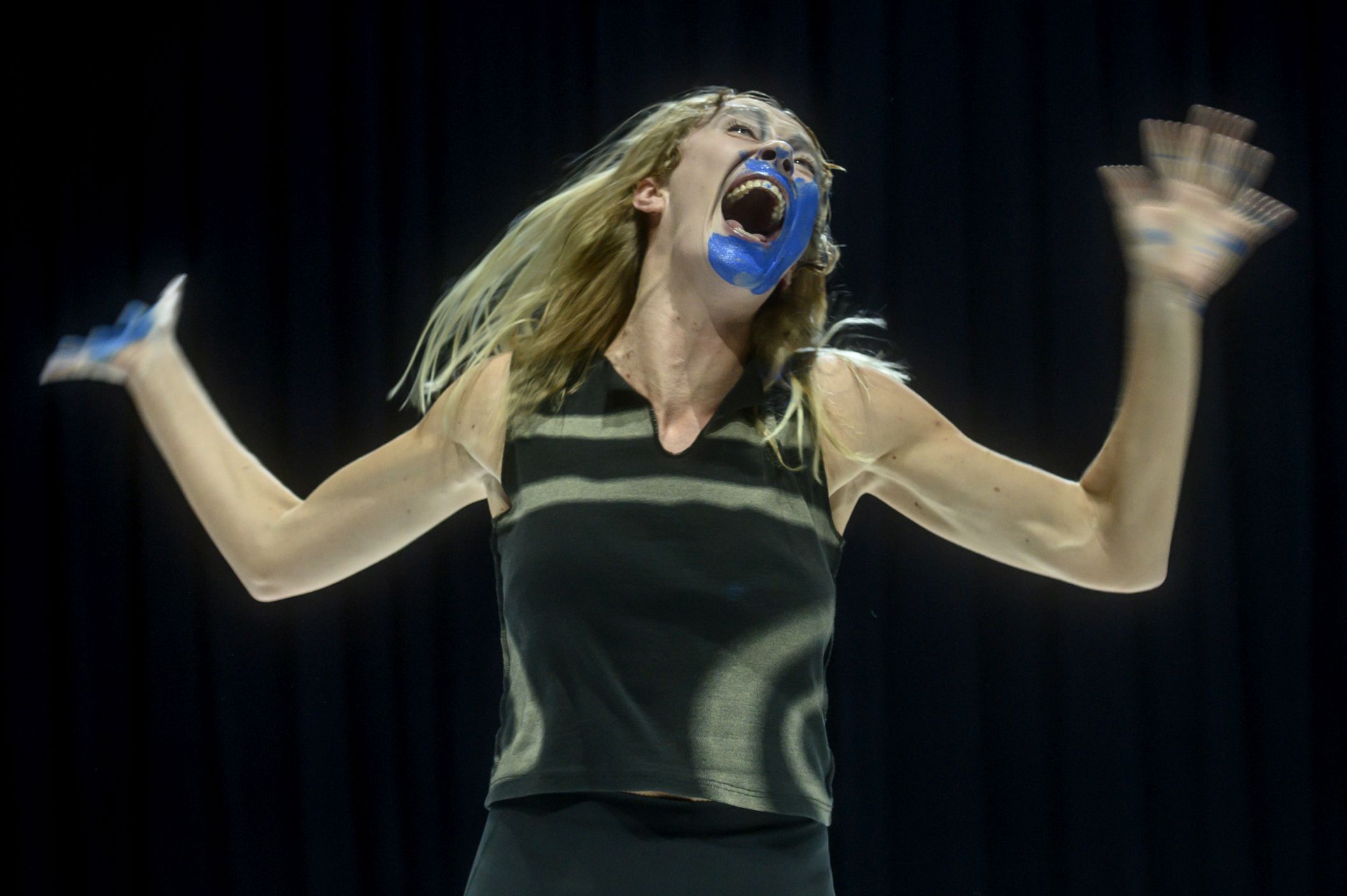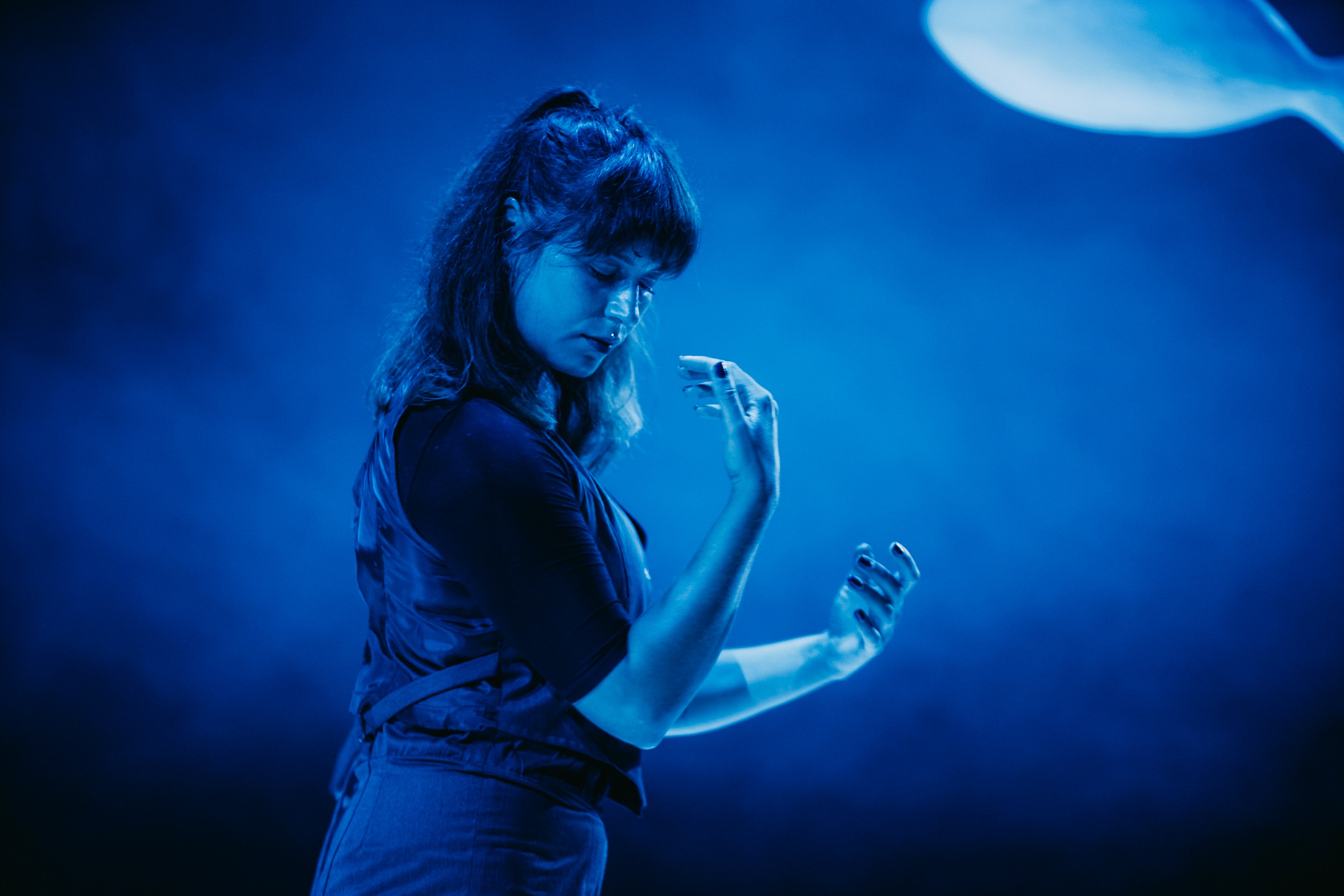This season Lithuanian playwright Marius Ivaškevičius, who wrote the play Russian Romance (Lith. Rusiškas romanas) about Leo Tolstoy in 2014, has participated in two more premieres of the same play - in Vilnius and Novosibirsk. The first staging of Russian Romance in Moscow, 2015, won several Golden Mask Awards, the main reward of Russian theatre; one of them was granted to the dramatist. The 45-year-old writer is accustomed to various trips to his opening nights - his plays are staged in Vilnius, Moscow, Bologna, Grenoble, Tallinn, Riga, Trieste, Lorraine, New Zealand and etc. Visitors of the new drama festivals in New York, London and Paris have also heard the readings of the plays by Ivaškevičius.
Ivaškevičius comes from a small town Molėtai. Having graduated from Vilnius University where he studied the Lithuanian language, the would-be playwright successfully tried his hand in prose, journalism and film direction. His first play The Neighbour (Lith. Kaimynas) won the dramaturgy competition and was staged at the State Youth Theatre in Vilnius. However, as is often the case with the first plays, the author and the director did not get on very well. So, Marius Ivaškevičius decided to direct his other three plays - 8-230, It's Me (Lith., 8-230, tai aš), Malыš and Close City (Lith. Artimas miestas) - himself. The performance Malыš that speaks about the Lithuanian and Russian families united by exile was included in the repertoire of the Oskaras Koršunovas Theatre, whereas the other two plays failed to draw the attention of any Lithuanian theatre. And yet with time, Close City has become the most popular play by Ivaškevičius staged abroad. The play reveals the life of a woman from one family - the wife and mother - who lives a completely different version of her fate in another city; a much more interesting, riskier, and more sexual version. Perhaps one of the most dramatic stagings of Close City at the Latvian National theatre in Riga was created by Russian director Kiril Serebrenikov. His interpretation was referred to as an erotic thriller by critics.
Now, it would be rather complicated to say which of the subsequent plays by Marius Ivaškevičius has had more favourable fortune - Madagascar (Lith. Madagaskaras, director Rimas Tuminas) at the State Small Theatre of Vilnius, Expulsion (Lith. Išvarymas, director Oskaras Koršunovas) at the Lithuanian National Drama Theatre, or Russian Romance (director Mindaugas Karbauskis) at the Mayakovsky Theatre in Moscow. All these plays have been staged repeatedly and in various countries; however, these well-known masters of theatre were undoubtedly the first ones to try their luck at them.
All plays by Marius Ivaškevičius have an interesting story of their creation. For example, the character of Madagascar was suggested to the dramatist by Rimas Tuminas, who was looking for someone to write about geopolitician Kazimieras Pakštas, an extraordinary pre-war Lithuanian figure, and his idea to establish a reserve Lithuania, where it would be safer and warmer to live than in the actual country, located in the north, next to gigantic and aggressive neighbouring states. Typically of the playwright, the surname of the character was changed humorously and the dreamer of the play became Pokštas (Eng. Joke). The idea of Pokštas to create a new Lithuania in Madagascar serves as an axis of the composition and the entire colourful cultural life of interwar Lithuania rotates around it. Ivaškevičius depicts men and women who sacrificed their lives for noble ideas. The play encourages the audience to reflect on the images of national mythology, i.e. the origin of Lithuanians, the liberation of Vilnius, and the dragons that can be easily identified as the traitors and conquerors of the country (communists and predatory Bolshevik Russia).
The performance Madagascar has become highly favoured by the audience. Since its opening evening at the State Small Theatre of Vilnius in 2004, the play has been shown more than 370 times, the first cast of actors has already been replaced by the younger generation. Madagascar has been included in school curriculums, published as a separate book and yet it still attracts spectators who wish to hear the language of pre-war intellectuals created by the dramatist and to see their ironically depicted dreams about a peaceful and proud country. With this performance the State Small Theatre of Vilnius has toured Poland, Russia, Finland, Austria, and Serbia. Ivaškevičius admits that he himself is surprised at the success of Madagascar abroad, “The topic and context of the play are highly Lithuanian. Having witnessed how foreign audiences react to the performance we were really surprised; sometimes the reaction is greater and people laugh more than in Lithuania. Such are the paradoxes of creation. It has turned out that at about the same time all countries had a figure similar to our Kazimieras Pokštas, who was also making similar plans.”
Small Lithuania wants to hide from gigantic Russia and it is highly interesting that after the tour of the Lithuanians in Russia, Russian press expressed the following opinion, “The depiction of the history with such merciless irony to the fallacies of one's nation and, at the same time, with such deep love to its essence is only possible from the hands of a representative of such a nation. And yet, the Russian audience is laughing sincerely at and feeling sorrowful not for Lithuanians but rather for themselves, as what is regarded as national in Madagascar is actually universal. All silliness is obscured by the helplessness of people against the realities of life. Pokštas is both Till Eulenspiegel and Ivan the fool - an effective link between the archetype and our unfortunate contemporary.”
Expulsion directed by Oskaras Koršunovas is perhaps the longest Lithuanian performance. Its three acts last for almost 6 hours and there are quite a few fans who keep coming back to see it. The topic, the performance of the actors, the musicality of the play, and the atmosphere uniting the audience with the characters are only some of the aspects causing such loyalty. This time, Marius Ivaškevičius presents the stories of Lithuanian emigrants that he heard during his special visit to London. The playwright said, “We met with the Lithuanians after work and talked; I visited some of their homes. They knew what my aim was. A few of the conversations were very open; I listened to several painful personal stories that, of course, I intend to keep secret for all my life.” This is not a documentary play. It gives a generalised picture of a person who has uprooted himself from one environment and is trying to take root in different, foreign surroundings. The main character named Ben is half Lithuanian, half Russian. Even this circumstance is highly significant as the author analyses the issue of identity in his play by adjusting dramatic intonations with humour.
The premiere took place right before Christmas in 2011. The press commented, “There, on the stage, they are searching for a safe place for their only life to unfold. Sometimes a garbage container, a wagon or the funeral home “Funeral” deserted at nights serves as such a safe haven. Sometimes - it's a luxurious apartment of an owner, whose dog lives a better life than an emigrant. Here, in the theatre hall of our country, we are watching the premiere just before Christmas and can't stop calculating hectically who still hasn't got a present, who we are going to sit at the Christmas Eve table with, and who has remained in the corner, a bar or container of a foreign land; or somewhere with no return.” The play was included in the repertoires of the theatres in Riga, Tallinn and Moscow. Riga ordered the Vilnius version of the play but the very performance spoke about Latvian emigrants. In Tallinn, Estonians played Lithuanians, whereas Mindaugas Karbauskis staged a chamber variant of Expulsion at the Mayakovsky Theatre in Moscow.
The cooperation between Marius Ivaškevičius and Moscow-based Lithuanian director Mindaugas Karbauskis started via social networks. The famous dramatist had the play Kant (Lith. Kantas), whereas the famous director was looking for something to stage. The Kant topic had also been suggested to the dramatist by one more Lithuanian theatre master - director Eimuntas Nekrošius. Nekrošius had inspired and consulted the playwright; however, he could not direct Kant himself due to various binding international projects. In the play by Ivaškevičius, daily ritual lunches and conversations occur among the philosopher and his friends, whereas Sergey Barkhin, a regular stage designer of Karbauskis, places the characters, audience and the entire performance into a hexagon covered in red velvet, reminding of an ancient university auditorium. As Ivaškevičius explained, “The lunch of the men in the play comes from the biography of Kant. He had his entire day meticulously planned. He got up at around 5 am, had tea, and smoked a pipe. Then he worked. After that, he had a lecture with the students who came to his house. At 1-2 pm, he had lunch with his friends. Depending on the topic of a conversation, such lunches sometimes lasted up to five hours. After lunch, Kant went for a walk. Up to this day there are legends that local people checked their clocks according to the time of the philosopher's walks. In the performance, Kant is at the centre of everything, and yet the main person in the play is his servant Martin. You know, positive characters are not interesting for theatre, movies or dramaturgy. The crooked ones are of much greater interest... However, there are no main and secondary characters in the play. The actors are not used to that, but Mindaugas Karbauskis managed to organise and secure everything. The actors got engaged in jazz and the audience were laughing for three hours.”
The conversations of the characters in the play provided the mature actors with the possibility to express themselves and to reveal the mastery of their performance as well as their sense of humour. Here are some excerpts from the reviews of theatre critics from Moscow, “The way Mikhail Filippov embodies Kant makes one want to enjoy this slowly and consistently, just the way he himself is enjoying white wine. The philosopher and comedian in one person relishing in the genre of elaborate intellectual drama with great gusto,” “In his performance, Karbauskis managed to make great artists live on the stage together. Here, nobody overshadows anybody. You're looking at the stage and experiencing that rare feeling of true theatre.”
Following the success of Kant, Karbauskis wanted to continue his cooperation with Ivaškevičius and suggested working together on his old dream of directing Anna Karenina by Leo Tolstoy. The interests of the dramatist and director coincided; however, when Ivaškevičius saw the BBC documentary about Tolstoy, his imagination was immediately captured by the writer and the turns and twists of his life, a number of which had made it to his novels, and especially to Anna Karenina. Ivaškevičius read practically everything about Leo Tolstoy that he could get his hands on - his diaries, the diaries by others, memoirs, and letters. As the result, the dramatist produced a play about writer's wife Sophia and her drama. According to Ivaškevičius, “She is blamed for being the most unsuccessful wife of the genius, but is it really true? And who is the most successful wife of the genius? Perhaps a successful wife would kill that genius completely. A big question is how to be the woman of the genius.” There is no Leo Tolstoy in the play, and yet all the speeches, events and feelings are centred on him. The dramatist believes that, “Anna Karenina offered a very important storyline of Levin and Kitty to my play. They are Leo Tolstoy and his wife Sophia in their youth. Just like Anna, Sophia kept repeating, 'I'll kill myself.' They were both obsessed with sick jealousy. Everybody suffers in such families. Including the children who cannot equal their parents. A spouse doesn't belong to the family, but to the world. In the Tolstoy family, this drama reached the culmination of tragedy. Even though Sophia sacrificed herself to her husband, in his late teachings Leo Tolstoy regarded family as evil that stops one from concentrating on spiritual life.”
Oskaras Koršunovas staged the play at the Russian Drama Theatre of Lithuania, whereas Marat Gacalov, a three-time laureate of the Golden Mask Award from Moscow, staged the play at the Novosibirsk Academic Youth Theatre “Globus.” In the opinion of Marius Ivaškevičius, “The Novosibirsk performance is highly visual, stylish and modern. So far, it has, perhaps, been the most visually impressive of all the three stagings; even though, emotionally it is not as strong as the stagings by Oskaras Koršunovas and Mindaugas Karbauskis.” Following the opening night in Vilnius, critic Alma Braškytė (menufaktura.lt) wrote that, “The entire Russian romance reveals the phenomenon of love; dissects and divides it into its most diverse manifestations: from the greatest altruism and sacrifice to egoism, the wish to penetrate and control; from the most spiritual to body-dominant impulses; from the greatest blessing of experiencing acceptance and affinity to excruciating jealousy and the despair of alienation.”
Marius Ivaškevičius came to both premieres from Germany, where he spent half a year at the International Artists' House Villa Concordia in Bamberg writing the play The Sleeping (Lith. Miegantys). The action of the play takes place... in 2117. The work is currently being translated into German. The biography of the eleventh play by the playwright has just begun.
Based on the information of the Association of Performing Arts Critics of Lithuania

